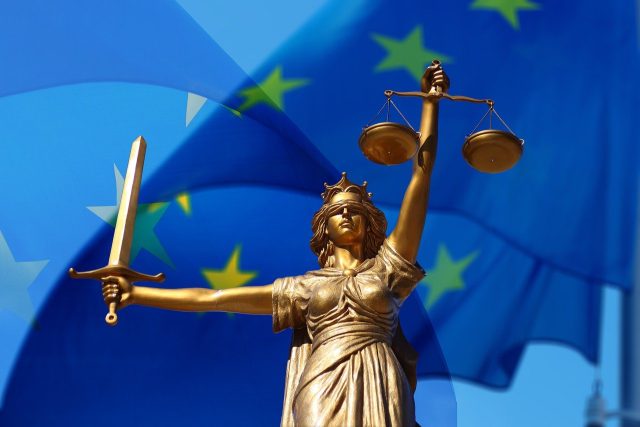
In the European political landscape, the European Conservatives and Reformists (ECR) group—which includes parties like Italy’s Fratelli d’Italia and Poland’s PiS (Law and Justice)—represents one of the most dynamic and ascending forces. The latest *Polling Europe* survey, conducted in March 2025 with a sample of over 5,000 EU citizens, provides a detailed portrait of public perceptions on major political and institutional issues. In particular, the report highlights the stance of ECR voters in relation to trust in the judiciary and relations with the United States, especially with Donald Trump.
Trust in the Judiciary: ECR Voters Are the Most Skeptical in Europe
One of the central questions of the survey concerns the independence of the judicial system. Only 22% of Conservative and Reformist voters believe that justice in their country is independent, compared to a European average of 36%. This is the lowest percentage among all political groups. Furthermore, 73% of ECR voters perceive the judiciary as influenced by political power, and as many as 32% consider it completely subordinated to politics.
This skepticism is also reflected in trust levels. Fewer than one-third of ECR voters (29%) say they trust their judicial system, while 68% explicitly state they do not. Again, this is the lowest figure among major European groups: by comparison, 57% of European People’s Party (EPP) voters express trust, and among Greens, the figure rises to 60%.
This disconnect reveals a rift between judicial institutions and a substantial portion of the conservative and sovereignist electorate, which sees the judiciary not as a neutral instrument but as a politicized power, often perceived as hostile to populist and nationalist movements.
The recent judicial convictions of Le Pen in France and Georgescu in Romania have been strongly disapproved by the European conservatives, increasingly concerned about the respect for democracy and popular sovereignty.
Relations with Trump: ECR Ranks Third in Popular Perception
Another key point of the survey deals with how European parties are perceived in relation to former U.S. President Donald Trump. Asked which parties have the closest ties to Trump, 17% of Europeans named the ECR, placing it third after the Patriots (26%) and the sovereigntist alliance Europe of Sovereign Nations (24%).
In Italy, the figure is markedly higher: 38% of Italians associate the ECR—primarily embodied by Fratelli d’Italia—with Trump. In Spain, the perception is less pronounced (15%), while in Poland—the homeland of PiS—the connection is more solid (27%). By contrast, in Northern European countries, the association between ECR and Trump is much weaker, signaling a cultural divide across EU regions.
It must be said that the relationship between European conservatives and Trump is not merely political sympathy, but also ideological alignment: a focus on national sovereignty, criticism of European elites, and emphasis on security, immigration, and the role of tradition. The ECR thus presents itself as the bridge between European conservatism and American Trumpism.
A Comparison with Other European Groups
The EPP, historically at the center of Europe’s institutional balance, maintains a moderate stance: 43% of its voters consider the judiciary independent, and 57% trust the system. Among the Socialists and Democrats (S&D), trust is even higher, with 57% expressing confidence and only 40% expressing distrust. The Greens and centrists from Renew Europe show the highest trust levels (60% and 50%, respectively), confirming a correlation between progressive leanings and institutional enthusiasm.
On the opposite side, alongside the ECR, we find the Patriots (such as Rassemblement National, Vox, Fidesz) and the ESN alliance (Alternative für Deutschland, Reconquête), which share the same skepticism towards EU institutions and a strong emphasis on national identity. Voters of these groups show even lower trust levels: only 29% for both Patriots and ESN, with over 60% expressing distrust.
The Italian Case: Fratelli d’Italia Between Distrust and Centrality
In Italy, the ECR is mainly represented by Fratelli d’Italia, currently in government. The Italian data aligns with European trends, with some national specificities. Only 29% of Italians believe in the independence of the judiciary, while 63% consider it politically influenced. Trust in the system stands at 45%, yet 49% still express mistrust.
The notable perception of closeness to Trump (38%) suggests that the Italian ECR electorate sees him as a model of leadership alternative to the European mainstream. However, this ideological affinity may prove to be a double-edged sword, particularly in a continental context where Trumpism deeply polarizes public opinion.
The Polling Europe report paints a picture of an ECR strong in its electoral base but increasingly isolated from institutional consensus. Its voters distrust judicial authorities, view Trump favorably, and see European institutions as powers to be counterbalanced, if not outright opposed. As Europe heads toward the 2025 elections amid rising tensions between sovereignists and federalists, the ECR’s role will be crucial: will it be the kingmaker or the disruptive force? The ballot box will decide.



 Subscribe
Subscribe